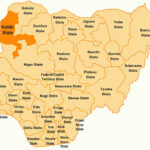In what is described as a major financial instrument designed to transform Nigeria’s seed industry and strengthen national food security, President Bola Tinubu on Wednesday approved the establishment of a N50 billion Presidential Catalytic Seed Fund.
Vice President Kashim Shettima , made this disclosur eon Wednesday in Abuja during the opening ceremony of the 8th Seed Connect Africa Conference and Exhibition, which coincided with the 50th anniversary of the National Agricultural Seeds Council (NASC).
The event brought together government officials, development partners, seed companies, farmers, researchers, and international stakeholders to discuss innovations shaping Africa’s agricultural future.
Represented by his Senior Special Adviser on Food Security, Dr. Kingsley Uzoma, the Vice President said Nigeria’s food security strategy cannot succeed without a strong, innovative, and resilient seed system.
“The seed is the first technology, the original data packet that determines the success or failure of the agricultural value chain. If the seed is weak, the harvest fails. If the seed is strong, the nation thrives,” Shettima stated.
He formally launched the Seeds for Renewed Hope Programme (S-RHP), describing it as the operational driver of Nigeria’s new seed transformation strategy.
To mark the programme’s commencement, government and private partners distributed branded improved seeds of rice, maize, and vegetables to farmers at the event.
The government aims to increase annual seed availability for major crops by 10 percent between 2025 and 2027 to help narrow Nigeria’s seed demand–supply gap.
The newly approved Seed Fund operationalises Section 45 of the NASC Act 2019 and is expected to stimulate private-sector-led seed production, expand access to high-quality seeds, and address structural bottlenecks in the industry. According to Shettima, the fund will deliver far-reaching socio-economic and environmental benefits.
The Vice President also revealed plans to strengthen seed testing laboratories, intensify enforcement against fake seeds, and increase youth and women participation in seed entrepreneurship.
The Minister of Agriculture and Food Security, Senator Abubakar Kyari, in his remarks, said the seed sector’s 50-year journey reflects Nigeria’s determination to build a resilient agricultural foundation.
“Agriculture is the measure of our national resilience and a pillar of stability,” Kyari said, just as he also added that quality seeds remain central to President Tinubu’s food security agenda.
The minister highlighted ongoing gains in the agricultural sector, including the expansion of the National Agricultural Growth Scheme, Agro-Pocket (NAGS-AP), increased wheat production across several states, the introduction of rainfed wheat cultivation in Plateau State, a breakthrough led by the Lake Chad Research Institute, recapitalisation of the Bank of Agriculture with ₦1.5 trillion, an additional ₦250 billion financing window for farmers, and the full operationalisation of the National Agricultural Development Fund (NADF).
“We are already witnessing a decline in food prices across several commodities. While we are not yet where we want to be, this positive trend confirms that we are moving in the right direction,” he added.
The two-day conference continues with technical sessions, exhibitions, and policy dialogues aimed at strengthening Africa’s seed ecosystem.











